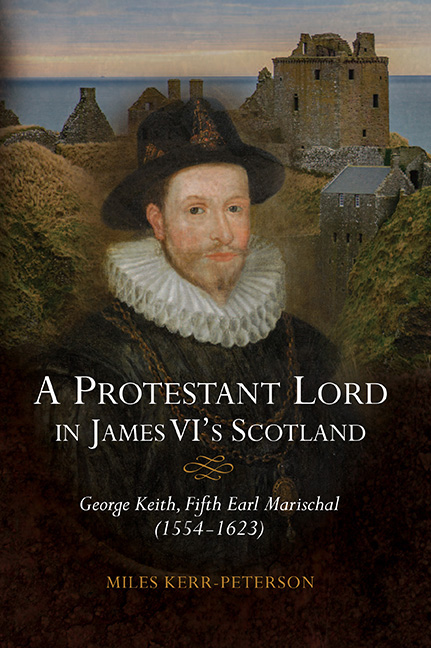Book contents
- Frontmatter
- Contents
- List of Illustrations
- Acknowledgements
- Conventions
- Abbreviations
- Map
- Introduction
- 1 Inheritance and Education, 1513–1582
- 2 Three Feuds and Jacobean Politics, 1582–1595
- 3 Service to the State, 1595–1623
- 4 Defending the Borders of the Earldom, 1595–1623
- 5 Family Strategies and Crises, 1595–1623
- 6 Lordship and the Reformed Kirk, 1560–1623
- 7 Economic Activities, 1581–1623
- 8 Marischal College, 1593–1623
- Conclusion
- Appendices: Genealogies
- Bibliography
- Index
- St Andrew Studies in Scottish History
7 - Economic Activities, 1581–1623
Published online by Cambridge University Press: 13 April 2019
- Frontmatter
- Contents
- List of Illustrations
- Acknowledgements
- Conventions
- Abbreviations
- Map
- Introduction
- 1 Inheritance and Education, 1513–1582
- 2 Three Feuds and Jacobean Politics, 1582–1595
- 3 Service to the State, 1595–1623
- 4 Defending the Borders of the Earldom, 1595–1623
- 5 Family Strategies and Crises, 1595–1623
- 6 Lordship and the Reformed Kirk, 1560–1623
- 7 Economic Activities, 1581–1623
- 8 Marischal College, 1593–1623
- Conclusion
- Appendices: Genealogies
- Bibliography
- Index
- St Andrew Studies in Scottish History
Summary
During James VI's minority the nobility of Scotland were encouraged to donate books to the young king's library to aid his education. William Keith, Master of Marischal (George's father), donated the Cosmographie Universelle of Andre Theuet. His brother Robert Keith, Commendator of Deer, gave Les Offices de Cicero, which was in both Latin and French. The selection of these specific books would suggest that they were important, or at least familiar, to the Keiths giving them. If these volumes were suitable gifts for the education of young James, then they would presumably have been suitable to give to young George, and both seem to have had an influence upon the boy.
As a scholar he was keenly interested in the themes of the Cosmographie and especially its related field of chorography. Finding evidence for the influence of Cicero's De Officiis on George is less easy. In broad terms and as part of a wider European phenomenon, there had developed in Scotland a system of neo-stoicism that was heavily influenced by the works of classical authors, especially Cicero's De Officiis. This philosophy carried notions of practical civic virtue, where the virtuous man, trained and improved by philosophy, became actively involved in the public and political life of his community. The movement was pioneered by men such as Justus Lipsius, with whom Marischal was familiar, as he possessed a handwritten copy of one of Lipsius’ smaller philosophical treaties, De Bello De Pace. Certainly later generations of the family remembered George as a reformer of both ‘the country and citizenry’, citing his efforts in the foundation of Marischal College, but also in estate improvement.
In De Officiis, Cicero gives advice on how a rich man should best spend his wealth. The greatest way, he says, is to spend money on works useful to the community, such as city walls, dockyards, harbours and aqueducts. Less appropriate are theatres, colonnades and temples. It is remarkable, and perhaps a small contributing factor to the fact that George would build three harbours and found two port-towns. These projects provide the focus for this chapter, which will assess the available evidence for Marischal's economic self-interest and ascertain how this interacted with his noble identity and whether there is any hint at Ciceronian benevolence behind it.
- Type
- Chapter
- Information
- A Protestant Lord in James VI's ScotlandGeorge Keith, Fifth Earl Marischal (1554–1623), pp. 151 - 166Publisher: Boydell & BrewerPrint publication year: 2019



